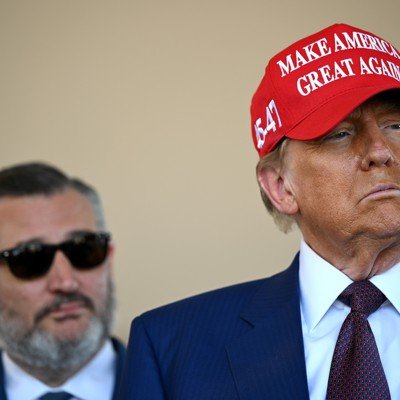Americans are feeling more confident in the U.S. military than they have in years, with record-high support for U.S. leadership abroad and increasing defense spending, according to results released Thursday from the annual Reagan National Defense Survey from the Ronald Reagan Institute.
At the same time, support for sending weapons to foreign partners is down, researchers found after surveying a bipartisan group of more than 2,500 U.S. citizens who answered questions from Nov. 8 to 14, in the days immediately following Donald Trump’s re-election.
“Fifty percent of Americans overall—61 percent of Trump voters—they prefer more of an engaged, internationalist American leadership approach on the international stage,” Rachel Hoff, the institute’s policy director, told reporters Tuesday.
Both figures are all-time highs in the survey’s six years. Time will tell how this desire for leadership squares with President-elect Trump’s more transactional, “America-first” foreign-policy style.
Along those same lines, respondents favored a bump in defense spending, as well as continued U.S. military basing around the world.
Seventy-nine percent said that they strongly or somewhat supported an increase in spending, the highest level ever recorded by the survey, and up from a historic low of 71 percent from the institute’s summer 2023 polling.
That is on top of Americans’ already inflated sense of how much money the U.S. pours into the Pentagon’s budget, according to the survey results, which in reality is around 13 percent of the federal budget.
“Now, Americans overestimate the amount that we are currently spending on the military, and so the fact that there’s an appetite for even more defense spending when Americans already … believe we spend a quarter or even half of the federal budget on defense … really puts a kind of a finer point on the desire for increased military spending,” Hoff said.
Results were less enthusiastic for continued spending when it comes to sending weapons to allies. Forty-three percent supported foreign spending, down 5 percent from last year.
Within that group, 54 percent support sending weapons to Israel and 55 percent support sending weapons to Ukraine, both slightly down from previous surveys.
But respondents were more confident than they’ve been in years that spending will go to good use, according to the results.
Fifty-one percent said they have a great deal of confidence in the military, with another 31 percent stating they have at least some. That’s up from a historic low of 45 percent high confidence after the withdrawal from Afghanistan in late 2021, but not nearly rebounded from the 70 percent rate when the survey began in 2018.
“One thing we did see during those years of decline, and I think this gets at some of the initial data we’re starting to see on the rebound, is that to a large degree, confidence in the military does have to do with questions of politics,” Hoff said.
Support for the military fell in both parties throughout Trump’s first term, the data shows, dropping to 56 percent just after he left the White House in 2021. Republican confidence plummeted yet more during the early Biden administration, as survey responses showed that Americans of both parties were concerned about politicization of the military and its leaders.
During and after his first presidency, Trump derided the military, including his hand-picked Joint Chiefs chairman, while right-wing commentators hammered away at what they called leaders’ dangerous “wokeness.” Democrats, meanwhile, were more concerned with extremists in the ranks.
A bump can also be seen in confidence that the U.S. can fight a war against China, Hoff said.
“There’s a real optimism among Trump voters about the U.S. military extending its edge in terms of superiority against China,” she said.
With that in mind, 27 percent of respondents said the U.S. should focus its forces on the Indo-Pacific region. Another 25 percent ranked the Middle East as the highest priority, while 18 percent pointed to Europe.
Trump has vowed to reinvigorate his crusade against NATO in his second term, decrying the organization as “dead” and deriding the U.S. obligation to protect its partner nations in the face of an attack.
Reagan National Defense Survey data shows 60 percent support for NATO as an alliance, with about three-quarters of respondents supporting the mandate to intervene in its defense.
The question of continued U.S. military presence abroad has stayed relatively steady since the first survey in 2018. This year, 62 percent favored permanent basing overseas, while 33 percent opposed it. Last year’s figure on the same question was split 66 percent to 28 percent.
In 2020, Trump ordered 12,000 of roughly 80,000 U.S. troops from permanent basing and rotational deployments in Germany, though it was an undertaking so large that it couldn’t get off the ground before President Joe Biden took office in early 2021, when he quickly reversed his predecessor’s decision.
That total presence now sits at around 100,000, following a surge of troops sent to support countries on NATO’s eastern front after Russia’s invasion of Ukraine.
Trump did manage to pull 700 troops out of Somalia in his final days as president, a contingent of mostly special operations forces who helped Somalian forces fight back against al-Shabab, al-Qaida’s biggest and most well-funded affiliate.
A year later, those troops were back in place, after persistent private and public lobbying from Defense Department officials.


